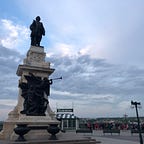The Portuguese City in China
History of Macau
The European Colony in China, which was a hub of trade and prosperity, and now boasts a unique history of cultural intermixing. No, not Hong Kong, but Macau. The History of Macau began nearly three centuries before its sister colony was born, and instead of the British, it was the Portuguese that got their hand on the colony. Furthermore, Macau cannot be seen as a mere “Second Hong Kong”, as its history was widely different, which influenced its unique character today.
Beginnings
The concession of Macau to the Portuguese was a controversial event, as the “handover” of the town was a four-decade-long process, that in the end, failed to establish the nature of the Portuguese presence. The Portuguese were forced to pay a fare in return for governing the island, and while they saw it as rent, the Chinese saw it as tribute.
By 1557, Macau became a formal trading port of Portugal under Chinese Sovereignty, which allowed for a Chinese representative to be provided by the Ming Emperor of China. During the first century of its existence, Macau served as a vital trading hub and layover port for Portuguese traders.
